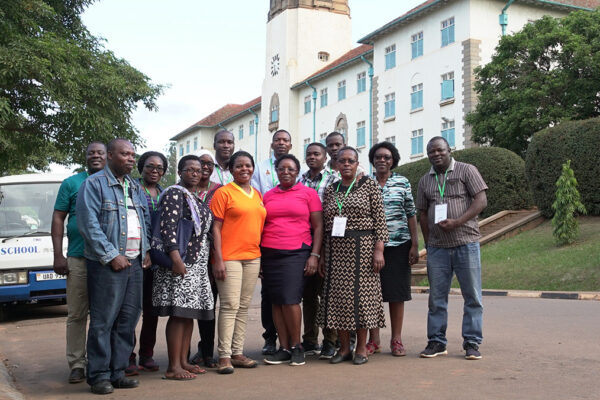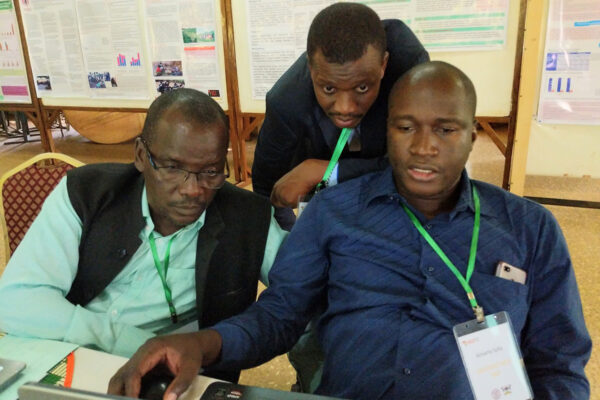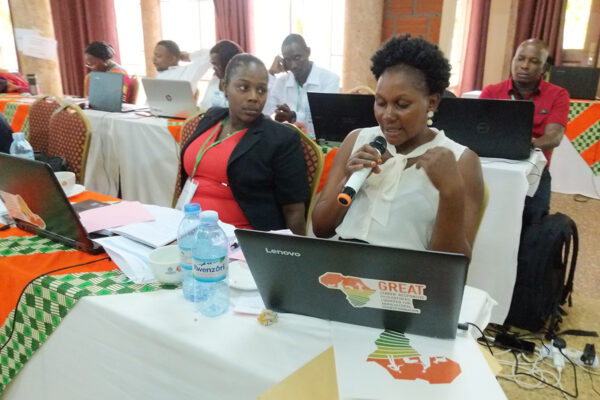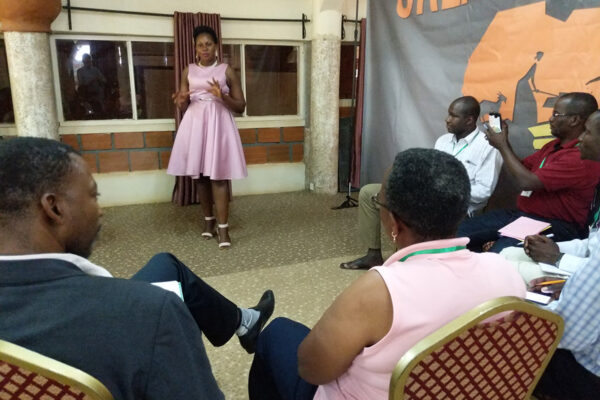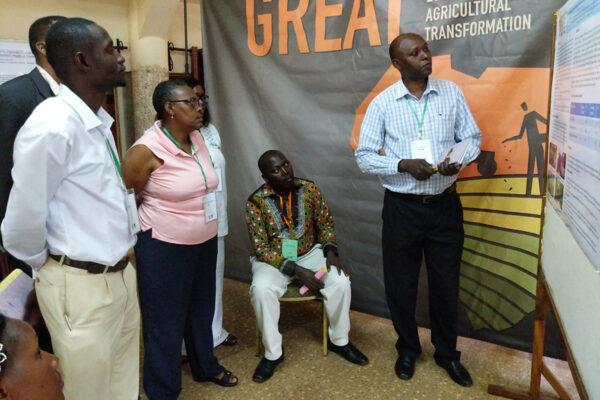Gender-Responsive Legume Breeding Course
The third GREAT course, Gender-responsive Legume Breeding, took place in Kampala, Uganda, over two weeks in July 2018 and January 2019, with mentor-supported field work in between.
To broaden learning and deepen understanding, participants attended in interdisciplinary teams, combining biophysical scientists, like plant or animal breeders, with social scientists, like sociologists and economists. Sessions on mixed methods approaches strengthened skills for researchers from all backgrounds, and enabled Fellows to fluidly communicate across qualitative and quantitative research disciplines. This enables more effective project management and development of more inclusive and effective technologies, which leads to better adoption and enhanced outcomes for farmers and consumers–both women and men.
Sponsored by
The Bill & Melinda Gates Foundation
Course biobook
Learn more
Connect with our team for more information about courses.
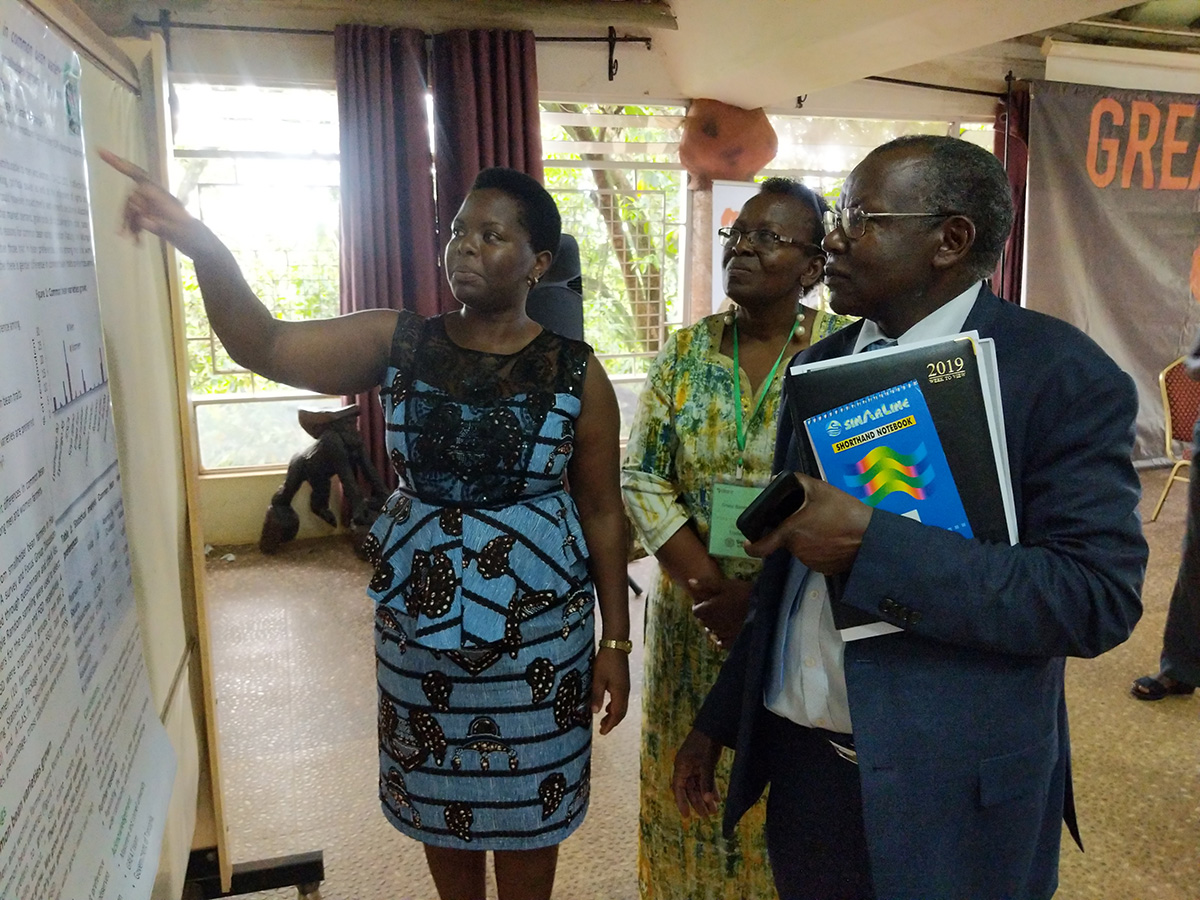
Course Objectives
In Week 1 of the GREAT course, participants learned applied gender theory and develop their own mixed methods research plans at Makerere University, in preparation for heading out to the field. In Week 2, participants learned how to analyze and write up data collected from mixed methods research, and GREAT worked with participants in strategies for effective communications, institutional transformation and building a community of practice. At the close of Week 2, participant teams competed for seed grant funding to further data collection and publish case studies. Two Fellows from each course were also selected to receive further training and take on training roles with future GREAT courses.
Part One
Week 1 Training: Makerere University
Gender-responsive research design:
1. Self realization, conceptual clarity, and interdisciplinarity
2. Methodology: qualitative and quantitative
3. Research question and case study
4. Impact assessment and participatory methods
Part Two
Field Work Phase: Participant Field Sites
Gender-responsive research application
5. Research planning and field data collection
Part Three
Week 2 Training: Makerere University
Gender-responsive research analysis; gender-responsive research communication; gender-responsive research community building
6. Data analysis and reporting
7. Communication to policymakers and the communities
8. Institutional transformation
9. Community of Practice
DESIGNED BY
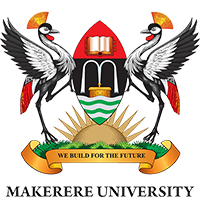

COURSE PARTICIPANTS
Improving Groundnut Productivity and Seed Systems in Burkina Faso
This project focuses on ways and means of establishing efficient, sustainable seed systems for an important but neglected staple crop in Burkina Faso, groundnut. Such seed systems will provide farmers with a reliable supply and a range of choices of quality seed, well adapted to local conditions. The project will adopt participatory and interdisciplinary approaches, in close partnership with farmer organisations, non-governmental organisations and other stakeholders of the groundnut industry to select varieties that suit current and future needs, such as food and cash. Capacity of farmer groups – with higher focus on women farmers – will be strengthened in groundnut production, seed production techniques, monitoring seed quality, prediction of demand, and marketing.
Donor Agencies: Australia Awards / the Australian Agency for International Development (AusAID)
Tropical Legumes III Project: INERA, Burkina Faso
The Tropical Legumes III project (TLIII) is a major international initiative partnering the International International Crops Research Institute for the SemiArid Tropics (ICRISAT), the International Center for Tropical Agriculture (CIAT), the International Institute of Tropical Agriculture (IITA), eight African or Indian national/state, and other partners, to develop improved cultivars of common bean, cowpea, chickpea and groundnut and deliver their seed at scale to small-holders in Gates Foundation-focus geographies. In Burkina Faso this project aims to create varieties with a more complete character profile for resistance, while ensuring that they are adapted to the socio-economic conditions of the producers.
Donor Agencies: The Bill & Melinda Gates Foundation
Special PABRA Flagship Initiative in Burundi
This project covers different areas of bean research activities in Burundi, such as breeding, seed system, socio-economy (market aspect), nutrition and gender. Breeding activities are carried out on-station under plant population development and screening, and on-farms under participatory variety selection. Seed system activities are carried out in collaboration with seed producers, farmer’s organization and NGOs, and several categories of seed (pre-basic, basic, certified and quality declared seed) are being produced. Socioeconomic activities are carried out through impact assessments, surveys and linkage of farmers with markets, especially by empowering the whole value chain. Several business platforms have been created in different zones of production, commercialization and consumption hubs. Nutrition activities include developing high iron bean varieties and producing bean-based products such as mandazi, biscuits, bean flour and purée. Work is also being done under community crèches where vulnerable people, especially young children, are assisted. Gender activities are carried out by integrating different categories in research development activities.
Donor Agencies: The International Center for Tropical Agriculture (CIAT) / the Pan African Bean Research Alliance (PABRA)
Cowpea Genetic Improvement
The primary objective of the project is to improve incomes and livelihoods of rural communities in selected target districts in Ghana through increased production and utilization of legumes. Over 36,000 households are involved in legume production in Ghana, with cowpea being the second most important grain legume. The project seeks to develop improved cowpea varieties through farmerparticipatory variety selection, seed multiplication and training of farmers and agricultural extension agents on best practices in soybean production. The project involves germplasm collection in collaboration with National Agricultural System trials; on-farm trials alongside farmers’ own varieties; and training of extension agents including a “training-the-trainer” approach. It also includes seed multiplication and demonstration through field days, demonstration fields, the community seed system and seed companies.
Donor Agencies: The Council for Scientific and Industrial Research – Ghana (CSIR) / the Canadian International Development Agency (CIDA) / Seed Co., Ltd. / RMG Ghana, Ltd.
Tropical Legumes III Project: CSIRSARI, Ghana
The Tropical Legumes III project (TLIII) is a major international initiative partnering the International International Crops Research Institute for the SemiArid Tropics (ICRISAT), the International Center for Tropical Agriculture (CIAT), the International Institute of Tropical Agriculture (IITA), eight African or Indian national/state, and other partners, to develop improved cultivars of common bean, cowpea, chickpea and groundnut and deliver their seed at scale to small-holders in Gates Foundation-focus geographies. The objective of the TLIII project in Ghana is to enhance the competitiveness of cowpea for increased income and nutritional security for smallholder farmers in the dry lands of Ghana, and improve the livelihoods of smallholder farmers in drought-prone areas through enhanced cowpea production and productivity using integrated breeding methods (conventional, molecular and gender responsive).
Donor Agencies: The Bill & Melinda Gates Foundation
Genetic Diversity of Soybean Germplasm in Kenya (KALRO)
The project intends to generate data that would essentially be useful for breeding purposes. The main scope of the study revolves around studying the genetic diversity of soybean germplasm in Kenya. Germplasm was sourced from the Genetic Resource Research Institute (GeRRI), the Kenya Agricultural and Livestock Research Organization (KALRO), farmers and other institutions that readily provided the germplasm. We will study the diversity of the germplasm through phenotypic and genotypic characterization. This will provide the breeding program with parental material for further breeding activities as well as identify the cultivars already released for licensing. Further from the diversity study, we maintain germplasm as an annual activity and early generation seed for further bulking into certified seed.
Donor Agencies: Korea-Africa Food & Agriculture Cooperation Initiative (KAFACI)
Feed the Future Malawi Improved Seed Systems and Technologies Project
The project is promoting soybean seed production while working with small or medium scale farmers. These are farmers that usually work in farmer groups such as cooperatives or associations. However, good quality certified soybean seed is inaccessible to many smallholder farmers in Malawi, largely due to limited availability in shops and, when available, often unaffordable by many women farmers. Therefore, most farmers – especially women – recycle seed saved from previous harvests, resulting in decreased productivity levels that exacerbate household food and nutrition insecurity. Farmers often perceive recycled seed quality to be equivalent to certified seed for self-pollinated crops. In this study we will therefore conduct a perception study of the improved certified and recycled seed to understand farmer perceptions.
Donor Agencies: The United States Agency for International Development (USAID)
Tropical Legumes III Project: ICRISAT-WCA
The Tropical Legumes III project (TLIII) is a major international initiative partnering the International International Crops Research Institute for the SemiArid Tropics (ICRISAT), the International Center for Tropical Agriculture (CIAT), the International Institute of Tropical Agriculture (IITA), eight African or Indian national/state, and other partners, to develop improved cultivars of common bean, cowpea, chickpea and groundnut and deliver their seed at scale to small-holders in Gates Foundationfocus geographies. The primary focus of TLIII in Mali is breeding for striga and drought resistance. The project works in the Segou and Mopti regions, in collaboration with the Institute of Rural Economics (IER), non-governmenal organizations, farmers organizations and seed companies.
Donor Agencies: The Bill & Melinda Gates Foundation
Establishment of Complex Farming Pilot Village to Improve Small Farmers’ Income in the Peanut Basin of Senegal
The project will allow increased productivity and marketing of peanuts and chicken on small-scale farms through multiplication and dissemination of significant quantities of high-quality peanut seed (newly released varieties); training for farmers to improve their skills and knowledge around seed production, good management practices for peanut production and post-harvest management; indigenous chicken management technologies; and integrated agricultural practices.
Donor Agencies: Korean Program on International Agriculture (KOPIA)
Tropical Legumes III Project: Agricultural Research Institute – Selian
The Tropical Legumes III project (TLIII) is a major international initiative partnering the International International Crops Research Institute for the SemiArid Tropics (ICRISAT), the International Center for Tropical Agriculture (CIAT), the International Institute of Tropical Agriculture (IITA), eight African or Indian national/state, and other partners, to develop improved cultivars of common bean, cowpea, chickpea and groundnut and deliver their seed at scale to small-holders in Gates Foundation-focus geographies. This TLIII project is focused gender mainstreaming, sensitizing farmers to address gender inequality in farming to minimize gender gaps (who has access to and control over available resources); assessment on factors contributing to women’s participation in common bean value chain activities; analyzing gender operational structures – planting, weeding, fertilizer application, harvesting, and post-harvest-market technologies – so as to be able to sensitize the available labor saving technologies.
Donor Agencies: The Bill & Melinda Gates Foundation
Assessment of Access and Adoption of Biofortified Beans by Male and Female Farmers in Central Uganda
The National Agricultural Research Organizational (NARO) has been able to release five biofortified bean varieties in collaboration with international research organizations. However, with all the efforts invested in developing and releasing these varieties, little is known about their access and adoption by male and female farmers. Therefore, researchers sought to assess the access and adoption of the biofortified beans by men and women farmers in Mubende District, central Uganda. The study will involve 100 randomly selected respondents.
Donor Agencies: National Crops Resources Research Institute (NaCRRI)
Improving Drought Tolerance and Nutritional Quality of Bambara Groundnut Grain Through Mutagenesis
Bambara groundnuts, considered the third most important food legume after groundnuts and cowpea, have a good balance of important nutrients for humans with protein and carbohydrates making up more than 50% of the grain. Project activities include: (i) surveys to determine the extent of cultivation and constraints associated with Bambara groundnut production in Kabwe district of Zambia; (ii) collection and evaluation of germplasm obtained from the International Institute of Tropical Agriculture (IITA) and the national gene bank, which identified a number of vigorous and high-yielding accessions which can be introduced for Zambian farmers; (iii) testing accessions for homozygosity to identify a suitable accession which can be exposed to mutagenesis so as to generate variants which will be screened for drought tolerance, levels of antinutritional factors and nodulation potential. In order to improve the possible adoption of varieties that the programme will produce, we intend to involve as many Bambara groundnut stakeholders as possible in selection advancement decisions.
Donor Agencies: Mulungushi University
COURSE TRAINERS
GREAT’s training team draws from diverse experts with deep experience in areas including plant breeding, gender theory, community development, sociology, communications, monitoring and evaluation, participatory research, rural development, and more

Adeline Muheebwa
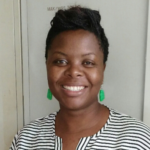
Brenda Boonabaana

Christine Leuenberger

Devon Jenkins

Elizabeth Asiimwe
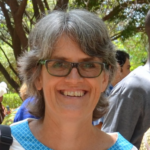
Eva Weltzien
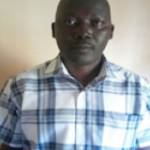
Godfrey Kayobyo

Eva Weltzien

Grace Bantebya

Hale Ann Tufan

Jaron Porciello
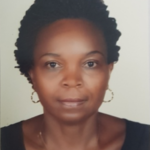
Jenipher Bisikwa
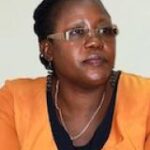
Josephine Ahikire
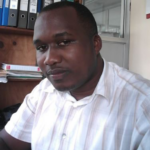
Lawrence Lubyayi
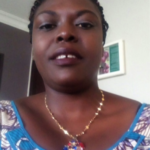
Lilian Nkengla

Losira Nasirumbi-Sanya
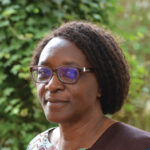
Margaret Mangheni

Margaret Smith
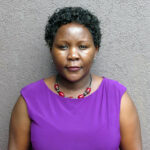
Maria Nassuna-Musoke
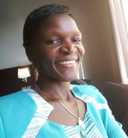
Miriam Kyotalimye
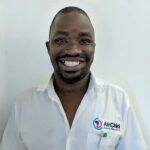
Ogara Collin
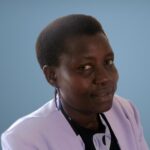
Peace Musiimenta

Richard Miiro


